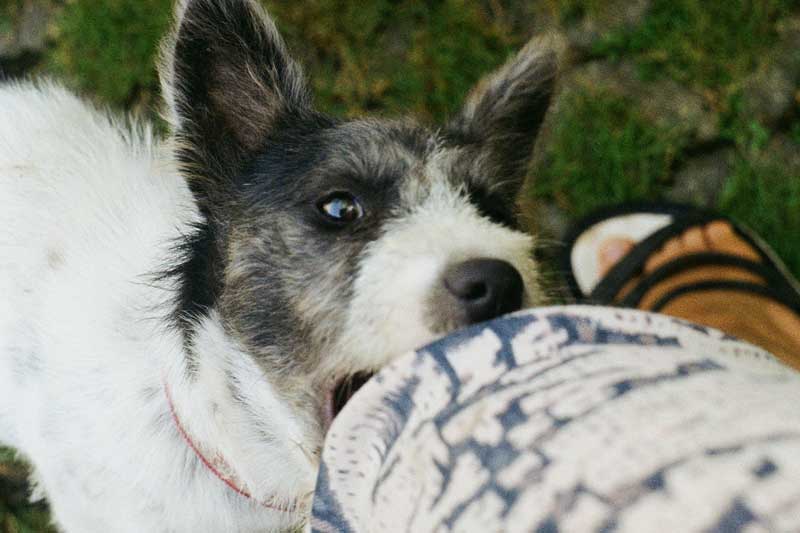From chewing, jumping, barking, digging and mouthing, we tackle the most common behavioural problems in dogs. Here are our top tips for resolving these common concerns for dog owners.
1. Chewing
All puppies and most adolescent dogs will chew on just about anything they can find around the house and yard. Here are some tips to help with this behavioural problem.
- Do not allow your puppy to get to something it isn’t allowed to have, to try to keep doors and cupboards shut, and use a play pen.
- Use a bittering agent on things your puppy keeps chewing on, such as citronella, chilli powder, pepper.
- Praise your puppy when they are chewing and playing with their own toys.
- Do not punish your puppy, instead make a loud sharp noise to interrupt the puppy and it won’t seem like it came from you, then give your puppy an item it is allowed to have.
- If you’re having problems with your puppy chewing on pants or shoes (while on you) try the following: stop still, then redirect your puppies’ attention to you and give them a toy, exchanging the pant bottoms or shoes for an exciting toy! Or bring in your obedience and get them to sit for a treat.
2. Digging
Digging is a natural behaviour for a dog. Although when they start digging up your lawn or garden, it becomes an issue. We suggest creating a digging pit for your puppy. Encourage them to dig in this area by placing their favourite treats and toys in there.
Start by:
- Sprinkling treats on top of the sand/soil.
- Next time poke a hole and drop treat/toys in.
- Then take the next step by covering the hole over making them have to sniff and dig it out.
How to prevent your dog digging in inappropriate places:
- Places their faeces in the current hole.
- Place a deterrent such as chilli powder/ bitter apple in the area.
- While making sure your puppy is watching, tell the hole off, not your puppy!
** Again don’t ever punish your puppy physically, try the above to make it unpleasant for them to continue the bad behaviour.
3. Jumping
Never allow your puppy to jump up to yourself or anyone else, this is bad manners and you will find even though you may think this is ok, some of your guests wont. Here are some tips for directing your puppy to the correct manners:
- Have treats handy at all times.
- If your puppy jumps, do not give them any attention, do not speak and especially no eye contact.
- Place your hand behind your back, look “uninviting”.
- Once they have stopped jumping and all 4 paws are on the ground, quickly reward them with a treat or praise.
- Be very consistent with this! Get everyone in the house and particularly guests to do this before greeting your puppy.
** do not push your puppy down, or say “get down”, this does not help as they are still receiving your attention and not learning from this. Remember, when your puppy sits, it is saying please, not just for food or treats, but for pats and saying hello.
4. Mouthing
Mouthing and biting at your arms and legs is a normal play behaviour for your puppy. This is the way they would act with their siblings in the litter. Here are some things you can try to redirect them to the correct behaviour.
- Try yelping when your puppy bites or mouths you. This is a similar reaction another puppy would do, and will give them the sign they are being too rough and it is not acceptable.
- You can try growling like an adult dog.
- Once they do stop, make an exchange, your arm for an exciting toy or treat.
- Only pat, play and cuddle your puppy when they are in a calm mood to avoid overexcitement, ignore them when they are being over the top.
** do not push your puppy down, or say “get down”, this does not help as they are still receiving your attention and not learning from this. Remember, when your puppy sits, it is saying please, not just for food or treats, but for pats and saying hello.
5. Barking
Barking is a natural behaviour, provided it is not obsessive and is for a good reason, which could be; protecting its environment, communicating with other dogs, or excitement. If the barking is excessive, this is not normal, and if not dealt with now could be a big problem when your puppy is an adult.
- Don’t tell your puppy off for barking if they are doing it for attention. Even if it’s a reprimand you are still rewarding them by giving them your attention.
**Create a distraction when they bark, such as
- Banging on a wall, window or door.
- Blowing a whistle.
- Shaking a coke bottle with rocks or bells in it.
This will make your dog stop barking to listen to what the noise is, you can then use a toy as a distraction for them. Never make it obvious it is you making the noise.
If you find that your dog is barking excessively, or you have had complaints from your neighbours, your dog may have a separation or anxiety issue. If you think this is the case, you may then need further help.
Want to learn more about our Puppy Pre-School?
Please contact our clinic on (08) 8370 3500 for more details on dog training classes to suit your needs.

